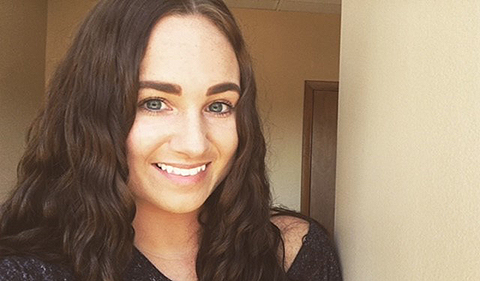
Carly McGinnis
After graduating from Ohio University with her B.A. in Psychology and Sociology-Criminology from the College of Arts and Sciences, Carly McGinnis ’14 earned Masters in Global Security & Intelligence at Point Park University. Soon after graduating, she felt like something was missing and was unsure if she wanted to pursue a career related to her Master’s degree.
In the summer of 2016, McGinnis started working at a non-profit as Reentry Caseworker at the local jail. She facilitated classes to women and gave them the tools to get ahead upon release from jail. She led discussions on the theory of change, helped her students establish new ways to look at situations and assisted them in setting goals for their future.
Still, although she wanted to continue helping individuals in the criminal justice system, she wanted to make a bigger impact. She turned to the treatment side of things.
Case Management in ‘Drug Court’
Recently, she started working as a Criminal Justice Case Management Specialist at the Washington Drug & Alcohol Commission.
She is the case manager for The Restrictive Treatment Program, also known as “Drug Court.” The program brings the full weight of the criminal justice system down on non-violent substance abusing offenders. The 40 individuals on her caseload have all received state prison sentences, but can stay out of prison by pleading to 23 months in The Restrictive Treatment Program. Most of these individuals are housed in the county jail.
Once she receives a referral, she conducts a drug and alcohol assessment. The assessment consists of drug/alcohol history, abstinence periods, mental health and medication history, physical health problems, past and current legal history/charges, family/origin, tobacco usage, employment/education history, etc. Once all of the data has been collected McGinnis makes a Level of Care recommendation. Typically, her recommendation is for these individuals to go to long-term treatment followed by a halfway house, which is a six to nine month period. There is a higher likelihood of success when the individual receives more intensive and long-term treatment.
As the case manager, she stays in touch with the therapist at the rehabilitation facility to ensure the individual is following all treatment recommendations. After the 6-9 month period of being away at treatment the individual will return to Washington, PA to complete an Intensive Outpatient level of care. While going to treatment regularly, the individual is expected to go to Alcoholics Anonymous/Narcotics Anonymous meetings, drug test, complete community service, and meet with their probation officer on a day-to-day basis. The individual is expected to be in court twice a month to discuss their case with the Judge. Before each court date, McGinnis and the Restrictive Treatment Program team meet with the Judge to discuss the individual and any issues or concerns they have.
The Restrictive Treatment Program team consists of McGinnis and a second case manager, Adult Probation officers, the District Attorney’s office, Public Defender’s office and the Judge. The main goal of the team is to help addicts in the criminal justice system by fully addressing their treatment needs and coordinating social service resources to improve their lives, thereby reducing recidivism.
The Best Part
What McGinnis loves most about her job is helping these individuals change their lives and watching them see and realize that they are capable of change. Sometimes the highlight of her day is receiving a positive call or email about an individual doing great and exceeding all treatment expectations and requirements. She knows people see so much in the media about overdoses, but she frequently sees the better outcomes.
“If we lived in a perfect world,” she says, “I would never see these individuals relapse or spend another night inside of a jail cell. With the heroin crisis people in the United States are facing today, that may never happen. But if I can assist someone in changing their life, that is a win at the end of the day for me. I believe people need to see more positive news stories that addicts can recover, which could aid in eliminating the stigma of addiction as well.”
Her OHIO Experience
McGinnis gives a lot of credit to Ohio University. After majoring in Sociology/Psychology and specializing in Criminology, she knew her path in life was to work with individuals in the criminal justice system.
“Ohio University prepared me for this career and I have to give praise to many of the Professors that I still look up to today, including Dr. Jennifer Steele, who really sparked my interest in criminology. Her class taught me so much about the criminal justice system. I would do anything to come back and have the Ohio University experience again. Four years went by way too fast!”



















Comments